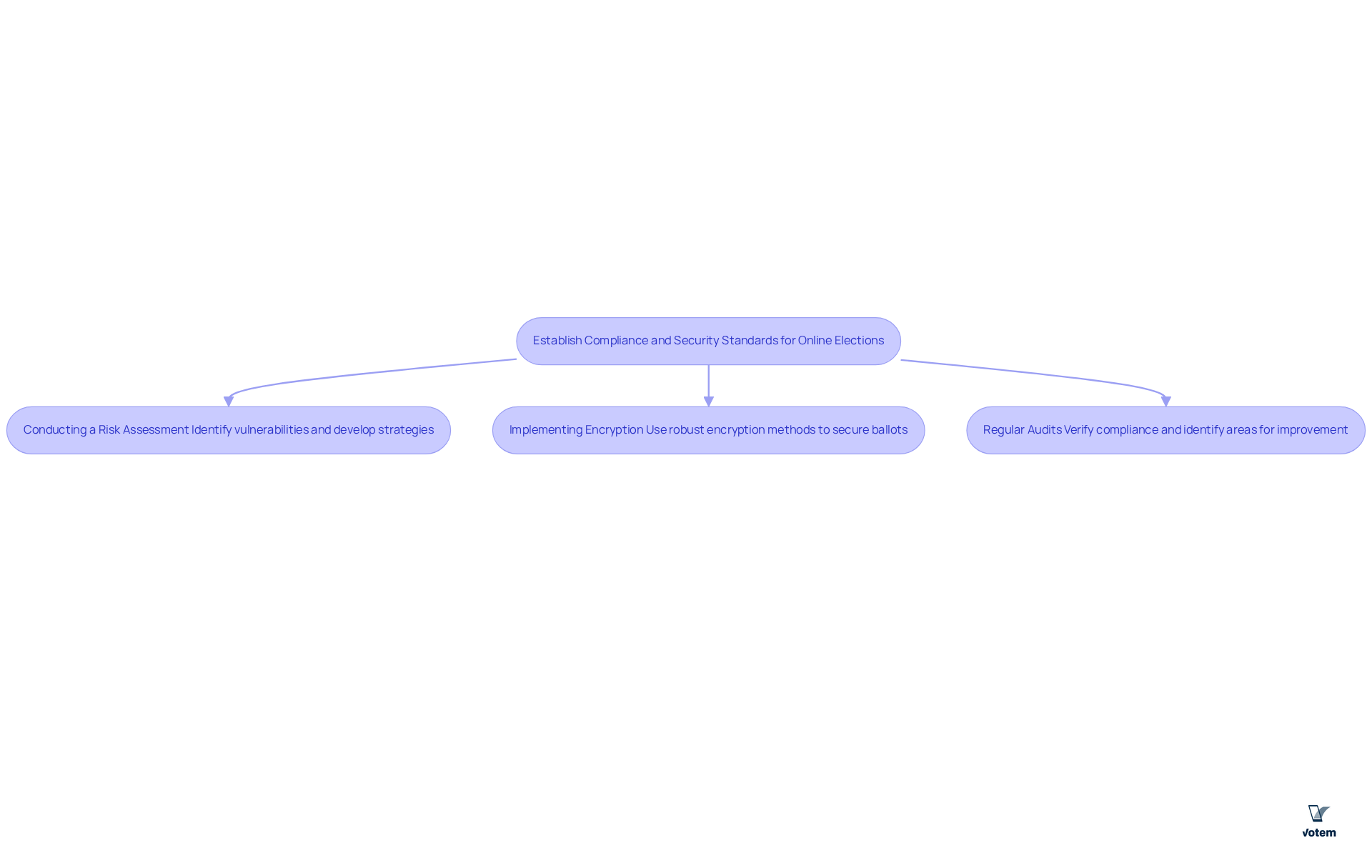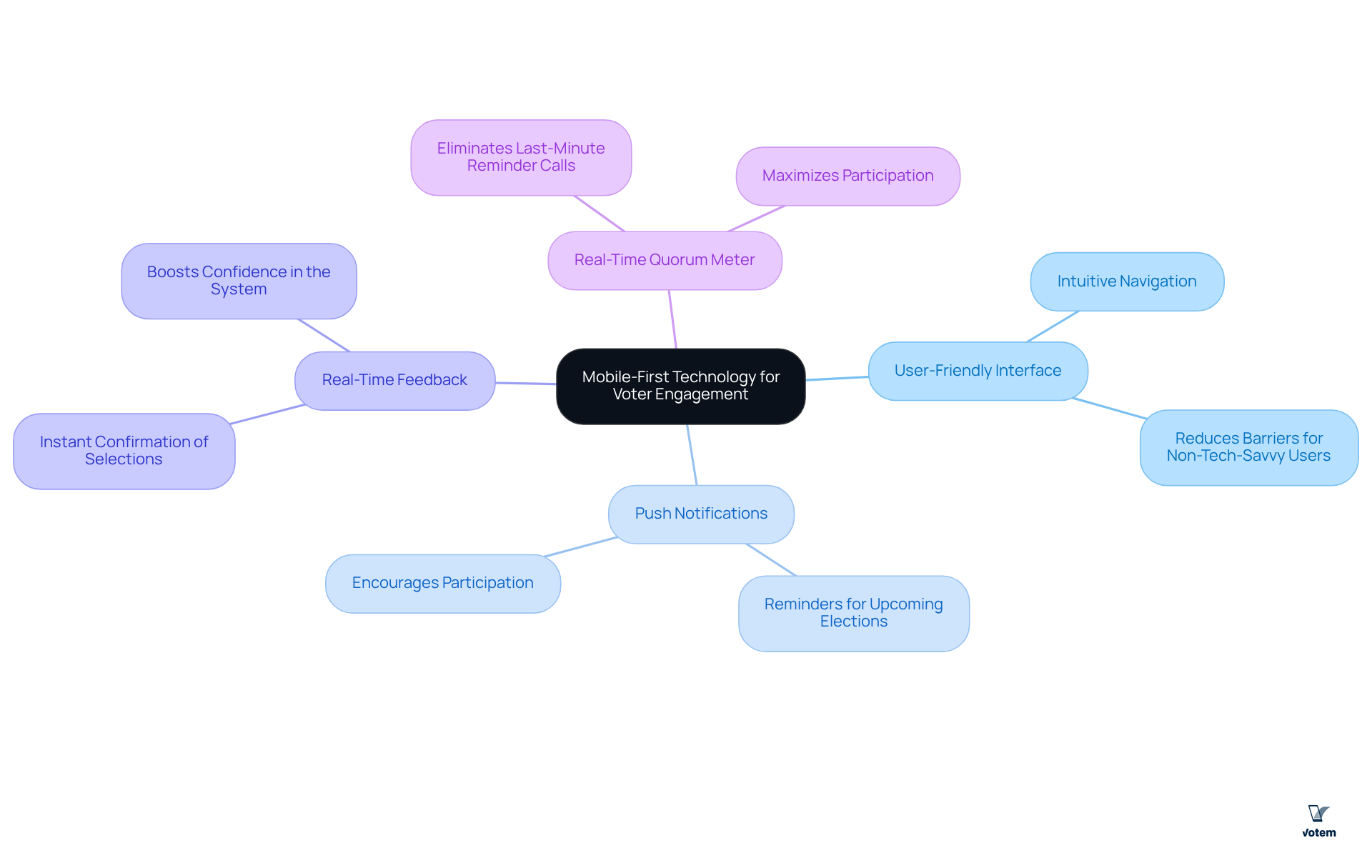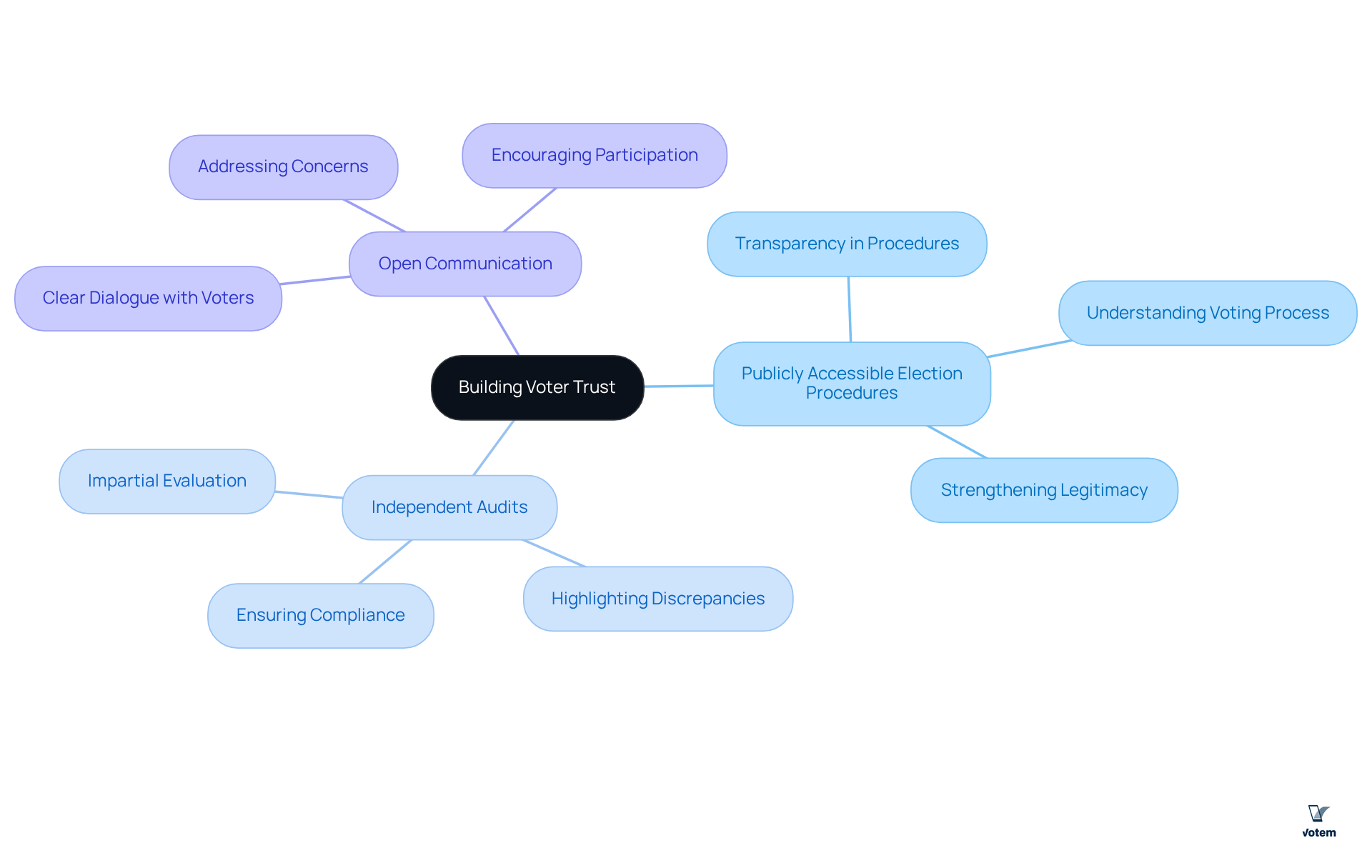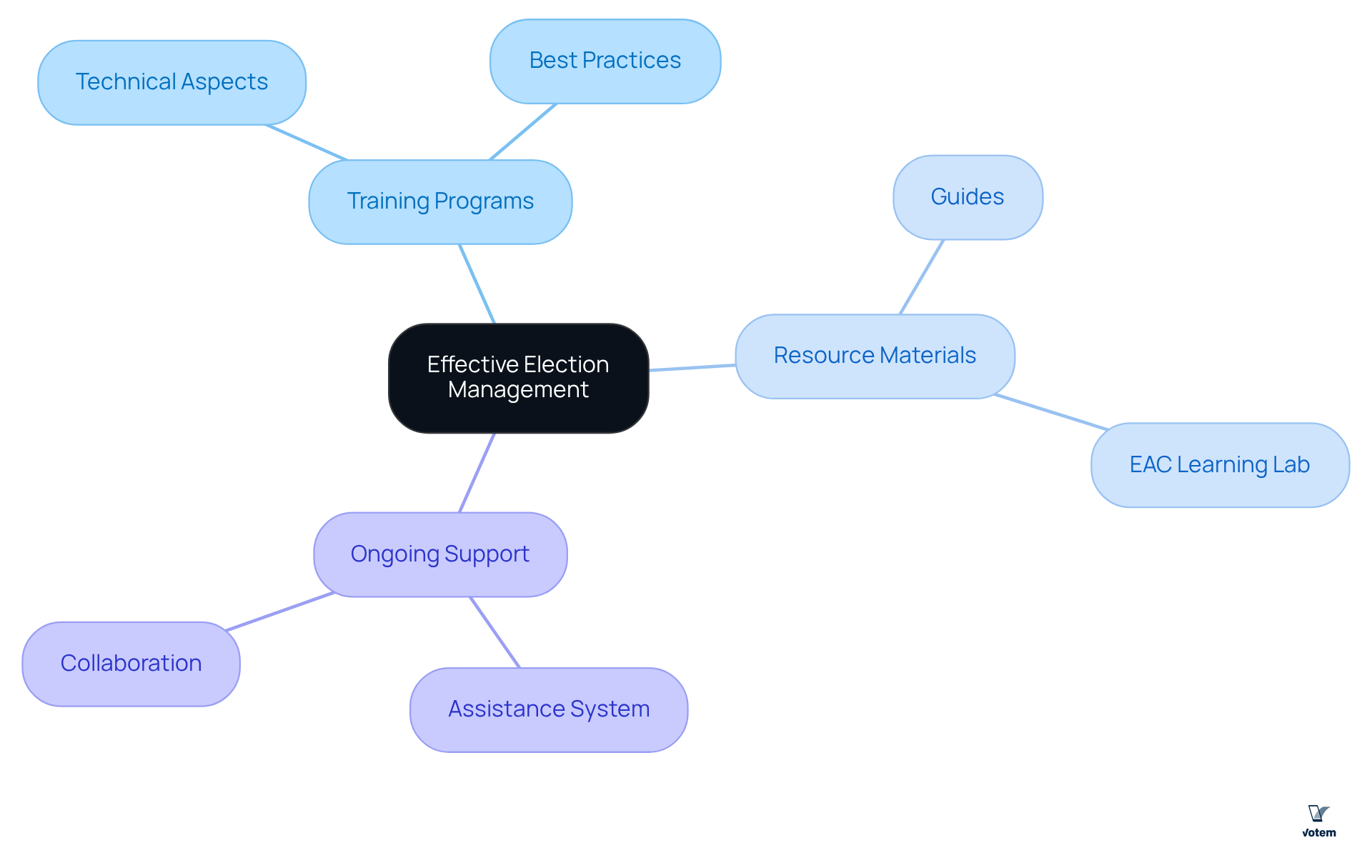Overview
This article presents five essential strategies for ensuring secure online elections within unions, emphasizing compliance, technology, transparency, and training. These strategies—risk assessments, encryption, independent audits, and comprehensive training for officials—work in tandem to bolster the integrity, trust, and participation in the electoral process. By implementing these measures, union leadership can foster a secure voting environment that not only meets regulatory requirements but also enhances member confidence in the electoral system. Furthermore, these strategies collectively create a robust framework for safeguarding the democratic process within unions, ultimately encouraging greater engagement from members.
Introduction
As the landscape of union elections evolves, the necessity for secure online voting systems has never been more pressing. Unions confront the critical challenge of ensuring compliance with regulations while fostering trust among their members in the electoral process. This article delves into five essential strategies that unions can implement to secure online elections, enhance voter engagement, and promote transparency. How can these organizations effectively navigate the complexities of digital voting while safeguarding the integrity of their elections and encouraging higher participation rates?
Furthermore, understanding the importance of these strategies is crucial for union leadership. The implementation of secure online voting not only addresses regulatory compliance but also strengthens the confidence of members in the electoral process. In addition, by promoting transparency, unions can cultivate a sense of ownership among voters, ultimately leading to increased participation. This article aims to provide actionable insights that empower union leaders to embrace the digital voting landscape confidently.
Establish Compliance and Security Standards for Online Elections
To ensure secure online elections, unions must prioritize adherence to relevant laws and regulations, particularly the Labor-Management Reporting and Disclosure Act (LMRDA). This adherence is crucial for safeguarding electoral information and upholding the integrity of the voting system. Key strategies include:
- Conducting a Risk Assessment: Identify potential vulnerabilities within the online voting system and develop comprehensive strategies to mitigate these risks. This proactive approach is crucial for safeguarding against threats that could compromise election integrity.
- Implementing Encryption: Employ robust encryption methods, such as 256-bit encryption, to secure ballots both in transit and at rest. This guarantees that sensitive information remains unreachable to unauthorized individuals, thus boosting voter trust in the electoral system. Votem’s CastIron platform exemplifies this commitment, encrypting every ballot to meet stringent security standards.
- Regular Audits: Schedule consistent audits of the voting system to verify compliance with security standards and identify areas for improvement. These audits not only strengthen security measures but also offer transparency, which is essential for promoting trust among group members.
As CISA emphasizes, “An electoral process that is both secure and resilient is a vital national interest.” By following these standards, unions can foster a safe voting atmosphere that boosts confidence among members and stakeholders, ultimately resulting in higher participation rates in polls. The effective application of these strategies has been demonstrated by Votem, which has handled over 13 million votes while significantly decreasing the frequency of disputed contests. Furthermore, organizations in Florida are exploring cost-effective digital election options, showcasing practical applications of secure online elections.

Utilize Mobile-First Technology to Enhance Voter Engagement
To enhance participation, unions must adopt mobile-first technology in their online polling platforms. This approach not only streamlines the voting system but also aligns with the preferences of contemporary participants. Consider the following strategies to implement:
- User-Friendly Interface: Create a mobile interface that is intuitive and easy to navigate, effectively reducing barriers for users who may not be tech-savvy.
- Push Notifications: Leverage push notifications to remind individuals of upcoming elections and deadlines, thereby encouraging participation.
- Real-Time Feedback: Introduce features that enable participants to receive instant confirmation of their selections, which boosts their confidence in the system.
- Real-Time Quorum Meter: Incorporate a real-time quorum meter to eliminate last-minute reminder calls, ensuring that participation is maximized.
Furthermore, Votem’s emphasis on security and transparency significantly enhances voter trust in the electoral process, establishing mobile voting as an essential resource for organizations committed to secure online elections. Research indicates that mobile voting can increase participation by as much as three times on launch day, making it an effective tool for organizations aiming to engage their members. With Votem’s fully-managed voting service, which is both adaptable and scalable, organizations can implement these strategies with confidence, knowing they are supported by a reliable provider that has successfully overseen more than 13 million votes.

Implement Transparent Processes to Build Voter Trust
To foster trust in secure online elections, unions must emphasize openness throughout the electoral procedure. This commitment to transparency is not merely beneficial; it is essential for establishing confidence in the electoral process and facilitating secure online elections.
Publicly Accessible Election Procedures: Ensuring that all election procedures are available to members is crucial. This transparency enables members to understand how secure online elections will be conducted, thereby promoting trust in the electoral system and strengthening the legitimacy of the outcomes.
Independent Audits: Engaging external auditors to examine the voting process and outcomes is another vital practice. Independent audits provide an impartial evaluation of the process’s integrity, which is essential for fostering trust among members participating in secure online elections. These audits can highlight discrepancies and ensure that the voting process adheres to established standards, further reinforcing the legitimacy of the outcomes.
Open Communication: Maintaining clear channels of dialogue with voters is imperative. Responding to any concerns or inquiries regarding the voting procedure helps alleviate doubts and encourages participation. For instance, offering consistent updates and opportunities for members to inquire can significantly improve their understanding and assurance in the process.
By adopting these open methods, associations can assure their members that the voting process is just and authentic, which is essential for secure online elections. Such measures not only enhance voter trust but also significantly increase participation rates. Online voting platforms, for example, have been shown to boost turnout by up to three times on launch day, as evidenced by successful implementations in various organizations. The dedication to openness and responsibility ultimately fosters an environment where disputed contests are uncommon, reinforcing the organization’s image as a reliable institution.

Provide Training and Resources for Effective Election Management
To ensure the effective administration of online votes, unions must prioritize extensive training and resources for their officials. This commitment is crucial for enhancing the overall integrity and efficiency of the electoral process.
Training Programs: Implement comprehensive training initiatives that address both the technical aspects of the online voting platform and best practices for effective election management. This dual focus is essential; it ensures that officials are well-prepared to navigate the complexities of online voting. Notably, Votem’s mobile-first UX can increase voter turnout by up to 3× on launch day, underscoring the significance of effective training in boosting voter participation during polls.
Resource Materials: Equip voting officials with valuable resource materials, including detailed guides and checklists, to streamline their navigation through the voting process. Additionally, the continuous content creation for the EAC Learning Lab offers free, practical training on various administration topics, thereby enhancing the credibility of the resources provided.
Ongoing Support: Establish a robust support system for voting officials, enabling them to seek assistance and share insights with their colleagues. The flexibility of the EAC Learning Lab allows users to complete or revisit trainings at their convenience, fostering a collaborative environment that promotes continuous improvement and instills confidence among officials.
By equipping election officials with the necessary training and resources, while also addressing common pitfalls such as ensuring compliance with applicable federal, state, and local laws, unions can significantly enhance the effectiveness of their secure online elections. This strategic approach is expected to lead to smoother processes and increased voter confidence.

Conclusion
Ensuring secure online elections within unions is paramount for maintaining the integrity of the electoral process and fostering trust among members. By implementing robust compliance and security standards, leveraging mobile-first technology, and promoting transparency, unions can create a secure and engaging voting environment that encourages participation and upholds democratic principles.
The article highlights several key strategies, including:
- Conducting risk assessments
- Utilizing encryption
- Performing regular audits to safeguard election integrity
Furthermore, adopting a mobile-first approach enhances voter engagement through user-friendly interfaces and real-time feedback mechanisms. Transparency is reinforced by making election procedures publicly accessible and engaging independent auditors, which collectively build confidence in the electoral process.
Ultimately, the commitment to secure online elections is not merely about technology; it reflects a union’s dedication to democratic values and member trust. By prioritizing these strategies, unions can ensure that their electoral processes are not only secure but also inclusive and participatory, paving the way for higher engagement and a stronger organizational foundation. Embracing these best practices will empower unions to navigate the complexities of online voting while fostering a culture of transparency and accountability.
Frequently Asked Questions
What laws and regulations should unions follow for online elections?
Unions must prioritize adherence to relevant laws and regulations, particularly the Labor-Management Reporting and Disclosure Act (LMRDA), to safeguard electoral information and uphold the integrity of the voting system.
What is a key strategy for ensuring secure online elections?
Conducting a risk assessment to identify potential vulnerabilities within the online voting system and developing comprehensive strategies to mitigate these risks is a key strategy for ensuring secure online elections.
How does encryption contribute to online election security?
Implementing robust encryption methods, such as 256-bit encryption, secures ballots both in transit and at rest, ensuring that sensitive information remains inaccessible to unauthorized individuals and boosting voter trust in the electoral system.
Why are regular audits important for online voting systems?
Regular audits are important as they verify compliance with security standards, identify areas for improvement, strengthen security measures, and promote transparency, which is essential for building trust among group members.
What impact do secure online elections have on voter participation?
By following security standards, unions can foster a safe voting atmosphere that boosts confidence among members and stakeholders, ultimately resulting in higher participation rates in polls.
How has Votem demonstrated effective online election security?
Votem has successfully handled over 13 million votes while significantly decreasing the frequency of disputed contests, showcasing the effective application of secure online election strategies.
Are there cost-effective options for digital elections being explored?
Yes, organizations in Florida are exploring cost-effective digital election options, demonstrating practical applications of secure online elections.

